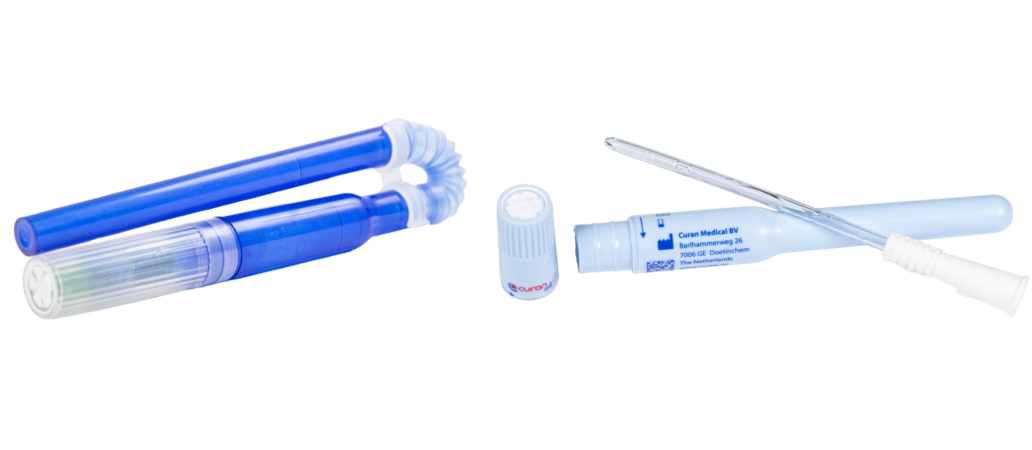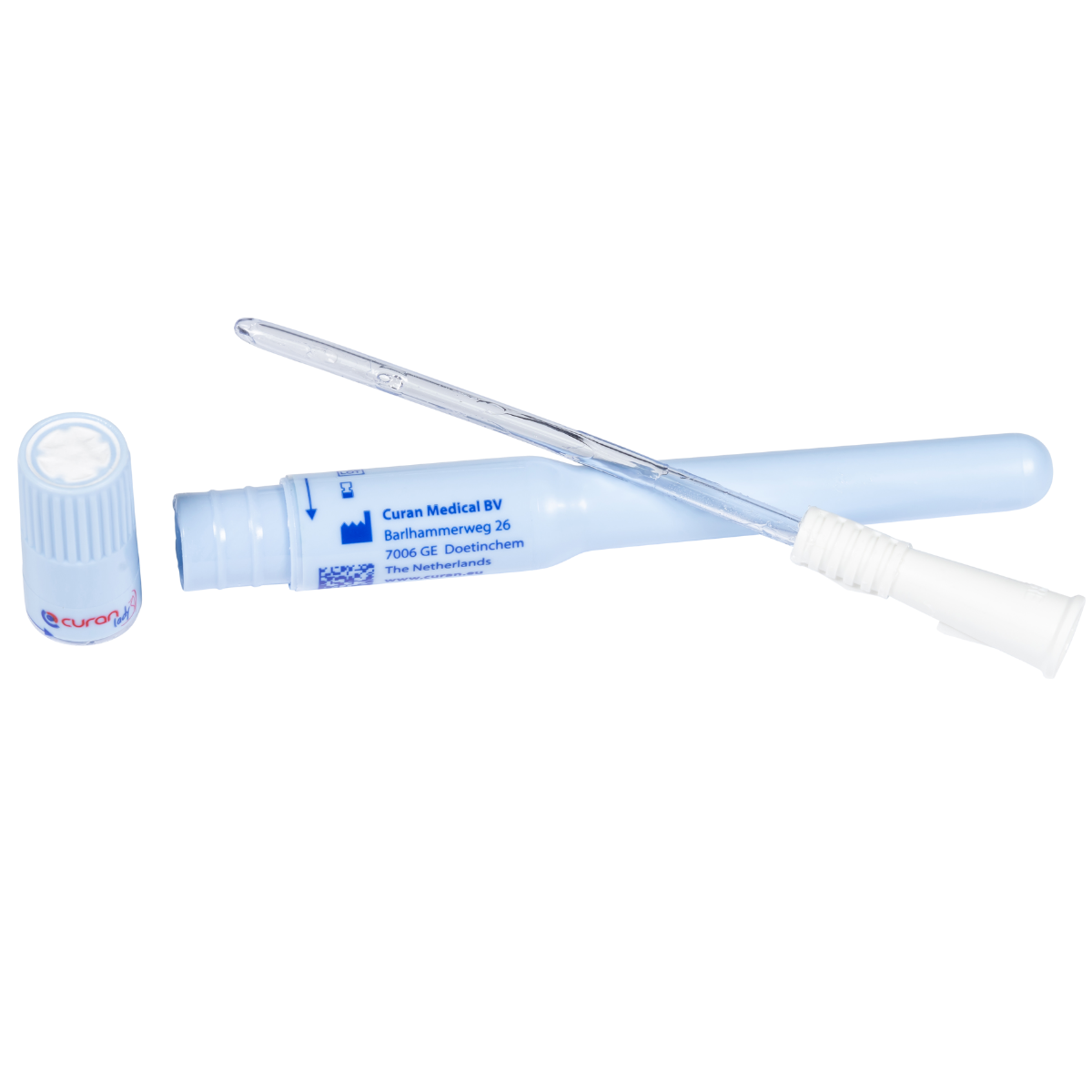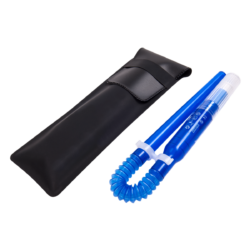Catheters and Sheaths
Curan ®Gel Intermittent Catheters
Available for male and female anatomy

Curan ® Gel Intermittent Catheters are available to suit everyone's needs and benefit from hydrogel coating for a mess free and comfortable insertion.
Curan Lady
Curan Lady is an intermittent catheter with a discreet compact design which fits into your life perfectly. The catheter has been designed specifically for female anatomy, and can easily fit in to your pocket or handbag.
Easy to use
The Curan Lady catheter is easy to use as:
- It comes with an easy grip and twist lid making it easy to open, even with limited dexterity.
- It has a gel compartment which provides a smooth, mess free coating.
- Curan Lady features smooth polished eyelets which, together with the smooth gel coating, help make insertion and removal free from irritation.

"Very discreet. Easy to use and small enough to dispose of without embarrassment."
MRS KIMBERLEY CHAMBERSCuran Man
Curan Man intermittent catheter is an ideal length for the male anatomy. The mess free coating and innovative design ensures it fits into your life perfectly.
Mess-free and easy-to-use
- Has a gel chamber to provide a mess-free coating for easy insertion and removal.
- Includes a Blue Grip® guide for hygienic touch-free insertion.
- Can be completely resealed after use and taken away with you when immediate disposal is not possible.
- Is designed to be folded for discreet and compact carrying when out and about.
- It comes with an easy grip and twist lid making it easy and quiet to open, even with limited dexterity.
- Features smooth polished eyelets which, together with the smooth gel coating, help make insertion and removal free from irritation.

"I have used this product when out it is very discreet and convenient. Especially with the pouch and clip making it very discreet for carrying. This blue rubber grip is also very helpful as I have some dexterity problems, all together a handy and easy to use product."
MALCOLM CORBETTRange of sizes
Curan Lady comes in 4 sizes and is available in individual sterile single use packs of 30.
| Curan Lady | Order code |
| 08 CH | CL08 |
10 CH | CL10 |
| 12 CH | CL12 |
| 14 CH | CL14 |
Curan Man comes in 3 sizes and is available in individual sterile single use packs of 30.
| Curan Man | Order code |
| 12 CH | CM12 |
| 14 CH | CM14 |
| 16 CH | CM16 |
Please note: you should not use intermittent self-catheterisation products without first consulting a healthcare professional.
Guide to female self-catheterisation
Watch this video to learn how to perform self-catheterisation when using Curan Lady as well as to find out about its design, features and after care.
Guide to male self-catheterisation
Watch this video to learn how to perform intermittent self-catheterisation when using Curan Man as well as to find out about its design, features and after care.
"It easily folds in half with the clip, and then you can place the catheter back in the cover for disposal. I think they are great, and really do seem like the ones I could do with."PETER B - Curan Man
"Product is good & superb service"MR PATRICK MOORE - Curan Man
"This catheter is very hygienic and easy to use. Would highly recommend it."MR THOMAS BLYTHE - Curan man
"Easy to use, convenient, no probs at all. Also excellent service."MR PATRICK MOORE - Curan man
"I find this catheter very handy to carry in my pocket. When I'm out I always carry 2 or 3 around with me. It's sometimes a little difficult to deposit used ones - not enough bins in public loos including large stores. Very easy to use no problems great with the gel in tube."MR WALTER LOWTHORPE - Curan man
"I have used this product when out it is very discreet and convenient. Especially with the pouch and clip making it very discreet for carrying. This blue rubber grip is also very helpful as I have some dexterity problems, all together a handy and easy to use product."MALCOLM CORBETT - Curan Man
"The Curan Man is a well-designed and constructed product with an inventive lubricant coating system that makes it mess-free and straightforward to use. I used the Curan Man size 12CH in my Mitrofanoff and found it to be extremely easy to use. The twist cap was simple to remove even for someone, like me, with dexterity problems. I especially like the way in which this catheter is evenly and quickly lubricated, there's no mess and the coating is just right. I often struggle with grips on catheters but found this one actually worked! I think because of the way the lubricant had been added there wasn't too much of it and so it was easier to grip the Blue Grip and use this to guide the catheter in. I connected the Curan Man to a night bag and didn't have any issues with the connection. Once finished I replaced the catheter back into the tube and disposed of, again with little mess. Having to carry as little around as possible is what I want, and this nearly ticks all the boxes. The outer packaging is a little chunky, and although it folds down to roughly the size of a + size mobile phone, it's still quite bulky. For it to remain folded, it requires a small plastic clip (included), without which the catheter doesn't remain folded. I'd like to see the flexible and smaller packaging of the Curan Advantage Man alongside the convenience of the self-coating Curan Man, providing a neater more discreet package. I'd also like to see the addition of a urine collection bag allowing users to use the Curan Man (or Curan Advantage Man) away from toilet facilities or on the go, for example. Overall I liked this product and would consider using it again, however, the catheter market is a crowded one, and for me, there are other products which are better."KERENZA HOLZMAN - Curan man
"I used these all the time now as my others was making me bleed a bit more than I should I love them they are packed nice and neat and easy to use and clean to use I won't change back thank you clinimed"KATIE CUMMINGS - Curan Lady
"I previously used SpeediCath but much prefer the Curan Lady as they are lubricated and are much easier to insert. They are very discreet as they look like a pen, they are also compact."MRS AMANDA CAHILL - Curan lady
"Discreet, hygienic, comfortable to use. Easy to pack when on holiday. Have been using these since 2015 and never had any issues with them."MISS D TAYLOR - Curan Lady
"I have tried other products but in my opinion this product is the easiest I've used. It's always well lubricated with the gel, which means you don't get any excess mess or leakage that you may get with other products."W MARSH - Curan lady
"Very discreet. Easy to use and small enough to dispose of without embarrassment."MRS KIMBERLEY CHAMBERS- Curan Lady
"I’ve found them to be incredibly easy to use and probably as importantly they are discreet enough that nobody would realize what they are.They look like a regular pen and small enough to fit into your handbag/make up bag.Come well packaged - again discreet and compact. Easy to store and access.Of the 6 I trialled the Curan Lady is a superior product."MRS KAREN MOSS - Curan lady
"This product is easy to store and very simple to use. It cleans quickly and can be recycled in the plastic waste."MRS SUSAN ROSSI - Curan lady
"Fantastic products, fantastic customer care & fantastic services available."MISS JADE WINDERS - Curan Lady
"I have been very happy with my catheters for a few years, and I have had less problems in using your product."MRS DIANE WITHERS - Curan Lady
"I did find Curan Lady much better to use but unfortunately I have had problems and am unable to insert it now (as it bends too much). I really do like this catheter and feel totally empty after use. I am hoping to be able to reuse it in the very near future. I have told my continence nurse how good it is. It is so easy to prepare for use and extremely comfortable to remove after."DIANE SEAFORD - Curan Lady
"I've been self cathing for many years and have tried lots of different brands. I had been using Speedi Cath compact plus, but got so fed up with the large number of "fails" in every box. Coloplast advised that four fails (the catheters just collapse on opening) is not unusual. I decided it was time to do my research and get samples of brands I'd not previously tried. I have an intention tremor making catheterising even more "challenging" The new Catheters I've been using are Curan Lady, and they are a dream to use. Easy to open, are in a gel, so no need to soak, or try coping with a slimy snake of a thing. The length is about the same as Speedi compact Plus, They pop easily back into their pen like holder, so discreet disposal. Very comfortable to use, and the company that supplies and delivers are the BEST that I've ever come across. Sorry to be so long winded, but making self cathing as easy and pleasant as possible is a must"CATRIONA MCDIARMID - Curan Lady
When you first begin using an intermittent catheter, there may be many questions you want to ask. Wherever possible, you should seek advice from a healthcare professional.
Answers to some frequently asked questions are listed below. If you cannot find the information you need please contact our live advisors, email info@clinimed.co.uk or call the CliniMed Careline on 0808 1596017.
How often should I use my intermittent catheter?
How often you use your intermittent catheter depends on the individual, the reason for catheterisation, how much fluid you drink and whether you have been prescribed additional medication. Your healthcare professional will have discussed this with you and how many times a day you need to catheterise.
Does ISC hurt?
It may feel like a strange sensation at first, but intermittent self-catheterisation (ISC) should not be painful. For some people, the urethra is sensitive when first learning and if this does not settle with time then ask for advice. It is normal for some people to find ISC difficult to begin with but after a very short time and with a little practice you will find it very straightforward.
Will I always have to catheterise from now on?
This will depend on the underlying reason for catheterisation. Sometimes ISC is a temporary measure until your bladder regains its normal function. You should report any changes in drainage volumes or pattern of passing urine to your healthcare professional who will review the clinical need for continuing intermittent self-catheterisation or altering the frequency.
What should I do if I can’t insert the intermittent catheter?
If you have tried and failed to insert your intermittent catheter, do your best not to worry or panic as this is a fairly common problem and leave it around 20 minutes before trying again. Try to relax, as much as you can, as this is key to successful insertion. Do not try to force the catheter in as this can damage your urethra. If you still can’t manage to insert the intermittent catheter, then contact your healthcare professional or the out of hours number you have been given.
What if there is no urine coming out of the catheter?
If there is no urine draining, remove the intermittent catheter and try a new one. Make sure you are putting the catheter in the right place. If there is still no urine drainage and you feel your bladder is still full, then contact your healthcare professional.
What should I do if I can’t remove my intermittent catheter?
Try not to panic and stay calm, your intermittent catheter can occasionally become stuck if you are tense and your muscles go into spasm. Relax for 5-10 minutes to allow muscles to loosen up. Coughing several times as you begin to remove the catheter can also help. If none of these suggestions work then you should seek medical advice.
What if I see blood after catheterisation?
Don’t worry. It is very common to see a few drops of blood around the tip of the catheter when you have finished intermittent self-catheterisation, or some pinkish discolouration of your urine. However, if bleeding is continuous or heavy then seek medical advice.
Are there any UTI symptoms I should look out for?
Symptoms such as fever, uncontrollable shivering, blood in urine, cloudy urine, burning sensation on catheterising, unpleasant smell from urine, tummy or lower back pain, may indicate a urinary tract infection (UTI). You may not experience all of the symptoms of a UTI but it is important that, if you suspect that you have a UTI, you contact your healthcare professional.
What should I do if I forget to catheterise?
You must use your intermittent catheter as soon as you remember. Then continue as normal at the regular intervals you have been advised.
What happens if I do not catheterise as regularly as I was told to?
Do not allow your bladder to become too full as you may find you have the following symptoms if you do: tenderness and bloating around the lower stomach, headache, feeling hot and sweaty. Occasionally forgetting to catheterise will not matter but if this happens too often it can cause urinary tract infection (UTI) and urinary leakage. Should the pressure in your bladder become too high there may be a risk of urine backflow to your kidneys, which could lead to complications.
What happens when I travel abroad?
When travelling, pack as many intermittent catheters as you will need for the duration of your holiday or business trip. To avoid any possible problems with customs, ask your healthcare professional for a written statement explaining that the catheters are necessary for medical reasons and are for your own use. It is also a good idea to keep a good supply in your hand luggage should your suitcase go missing.
What if the catheter goes into my vagina by mistake?
If your intermittent catheter accidentally enters your vagina during catheterisation, simply remove the catheter and dispose of it, then start again with a new catheter.
What about catheterisation during my period?
Good hygiene during menstruation is always important. This is no different with intermittent self-catheterisation. Every time you catheterise yourself, you should wash your genital area with a mild soap and rinse well; if you are having your period, you should change your tampon or sanitary pad often.
